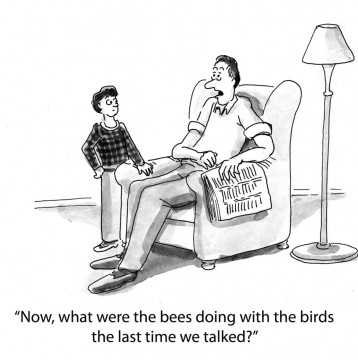How to Get out of Having the Birds and the Bees Talk With Your Kid

Shutterstock.com
World War II fascinates my 10-year-old son Michael, so I rented the movie Pearl Harbor from Verizon. I forgot what a horrible movie it is and how director Michael Bay tried to force a love triangle into the plot. Before the Japanese attack, there were a lot of intense kissing scenes, which bothered my 7-year-old son David.
“Every time they kiss, my penis starts to shake,” he yelled out.
We probably were not supposed to laugh, but my wife and I couldn’t help it. It was a genuinely funny line and it wasn’t his last. Spurred on our laughter, David said, “It’s like I have an alien in my pants. It just keeps getting bigger and bigger.”
(At this point I want to write a message to future David for when he Googles his name years from now and reads this. I am not writing this to embarrass you or the alien. You were just naturally funny and I hope you still are as you read this. If not, I’ll pay for the therapy … or a car … which ever is cheaper.)
I share this story first and foremost because, as I said, it’s funny. But also, because my wife then told me that I soon need to talk with my two boys about sex, especially Michael.
I said, “Really? His penis didn’t shake.” That earned me a cold stare.
This is the moment every Dad dreads. I have successfully avoided the “Father-Son sex talk” all my life. When I was in grade school, it was my older brother, and not my Dad, who tried to have the talk with me. He actually started with the birds and the bees. I put him out of our shared misery by saying, “I already know. I learned about it at school.” He said, “Okay, good” and left the room
There was a lot I would have loved to ask him about, but I was relieved he left. “The talk” is something both parties would rather avoid.
I have two older children from my first marriage. Fortunately, one of them is a girl, Stacia, now a young woman and a new mommy. I say fortunately, because it is a well established unwritten rule that “the talk” is a same-sex conversation.
I attempted to have “the talk” with my oldest son, Jonathan, when he was 12 years old. I started with, “Is there anything you want to know about sex?” He simply said, “No, I’m good.” And that was it. Like me when I was his age in the same situation, I’m certain there were things he would have loved to ask, but we both just wanted it to be over.
I think that parents subconsciously wait too long for the sex talk in hopes that the kids get the necessary information from friends at school. That way they can get the three anxiety-relieving words that they are hoping for — “I already know.”
And that brings me back to the future. Michael is only 10. In fact, he just turned 10. What is the right age? Is the “right age” getting younger and younger? For the answer to that question, I went to the spiritual guru I turn to for all of life’s important questions — Google.
Almost every doctor and child psychologist online agrees that there shouldn’t be a big sex talk. Instead, there needs to be a continuing conversation, a series of small talks based on your child’s curiosity and development. The conversation need not be explicit, but it should be honest, open and guilt free. The conversation begins as young as five or six and continues through puberty.
A U.S. News and World Report article gives some great advice from Laura Berman, assistant clinical professor of obstetrics and gynecology and psychiatry at Northwestern University’s Feinberg School of Medicine and author of Talking to Your Kids about Sex: Turning “The Talk” Into a Conversation for Life.
“The rule of thumb is you don’t answer more than they’re asking,” Berman says. If a 7-year-old asks where babies come from, “you don’t give them the full graphic description,” she says. “A baby grows in a special place in a mom’s tummy, and it becomes a baby,” you might respond. Responding in an age-appropriate fashion is important, since information will resonate differently at different ages. You could have the “exact same conversation with a kid at age 10, 12, and 14” and “they will hear completely different things.” Also, use your child’s questions as an opportunity to understand where he’s getting his information about sex. “Ask them a lot of questions,” Berman says, suggesting a response such as, “Well, that’s a great question. What made you think of that?”
The web site healthychildren.org also suggests you tell your children about sex when they ask or comment about it. They suggest never letting a “teachable moment” go to waste. Those moments can happen anywhere and at anytime, at the dinner table, the grocery store … watching Pearl Harbor.
Just so you don’t think that Dawn and I are total parental dolts, after the laughter we did tell David that the “growing alien” was perfectly natural and that just happens to boys. We have had several such talks with the boys over the years based on their questions, so we have been unknowingly doing a pretty good job
The next time we get a “shaking penis” alert, we’ll know that it is another teachable moment. Enough of these small conversations over time and I can once again avoid “the talk.”
Follow @LarryMendte on Twitter.


